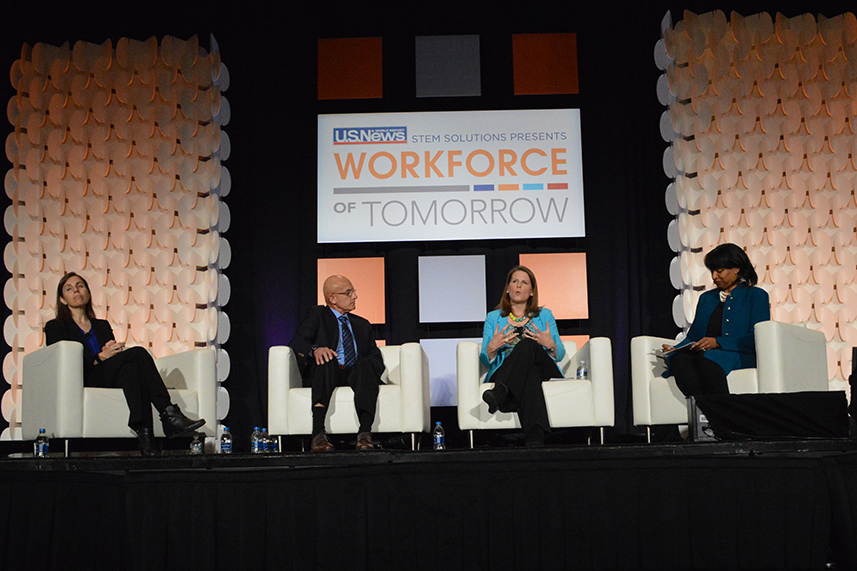Microsoft Military Affairs plays a critical role in building the workforce of tomorrow
By U.S. Marine Corps Major General (Ret.) Chris Cortez, vice president of Microsoft Military Affairs
At Microsoft, we use certain words to represent our values: Transformation. Innovation. Diversity. Inclusion. Empowerment.
They’re powerful words that guide how we approach our mission to empower everyone to achieve more. And last week, during a panel discussion about building the Workforce of Tomorrow, I spoke about how these values are shaping Microsoft’s impact on the future of our industry.
It’s a subject we’re passionate about—many of our programs are specifically designed to inspire people to pursue education and careers in STEM. Programs like Microsoft Software & Systems Academy (MSSA), TechSpark, DigiGirlz, and YouthSpark.
Microsoft Military Affairs plays an important role in fostering our culture of diversity and inclusion. Providing training and recruiting from within the military community is a relatively new endeavor for the IT industry—it’s a new pipeline of talent, and the men and women who advance through MSSA are finding incredible success.
At the event, I called for others in the IT industry to join us in training and hiring service members and veterans. It’s through programs like MSSA that we can build a more diverse workforce of tomorrow. And to succeed, it will take innovative thinking, a willingness to try new things, dedicated guidance, and thoughtful partnerships.
We’re already seeing how such partnerships help shift perceptions on both sides of the equation—improving how the industry feels about hiring veterans, and inspiring service members to think more positively about the qualities they bring to the table. We’re also seeing how the power of mentorship and role models helps make success more attainable, especially for those under-represented in the IT industry.
During a STEM Solutions breakout session, we discussed how service members and veterans are uniquely positioned for success in the IT industry. Even from basic training, they’re imbued with a sense of teamwork geared toward problem-solving. They’re also highly mission-oriented and adaptable, and they bring broad perspectives rooted in a wide spectrum of experiences and backgrounds. But mentorship is a critical component to their success in MSSA, and a key part of retaining graduates once they begin their careers at Microsoft or elsewhere.

Since Microsoft launched MSSA in November 2013, we’ve seen firsthand how giving service members and veterans critical technology training can help them successfully transition to rewarding careers in the IT industry. After just 18 weeks of hands-on learning, our graduates are often hired by Microsoft or one of our more than 280 hiring partners—including industry leaders like Accenture, Dell and Expedia.
So the program is not only changing lives, it’s also transforming what a typical IT worker looks like.
Take Ryen Macababbad, for instance. A former specialist in the Army with a lifelong passion for technology and learning, she enrolled in MSSA and found success at Microsoft as a program manager for Azure Active Directory. Or Gary Lehman, a Marine who had never considered a career in technology before he heard about MSSA. He now works as a site reliability specialist at Facebook.
In March, we celebrated the completion of our first expansion phase for MSSA, bringing the program to 14 nationwide locations capable of graduating 1,000 students per year. And by the end of June 2018, we’ll have brought YouthSpark events to military communities at five bases. The program is tailor-made to inspire kids about technology, and by bringing it to children on military bases, Microsoft is empowering an essential segment of our population with the skills they need to thrive in a technology-driven future.
The work we’re doing is about more than just giving people jobs—it’s about practicing what we preach. It’s about fostering learning, developing careers, planting seeds, and building a diverse future talent pool by reaching people of all backgrounds. Together with our partners, we’re lifting up the entire military community by preparing service members and their families for future-focused careers in technology.
